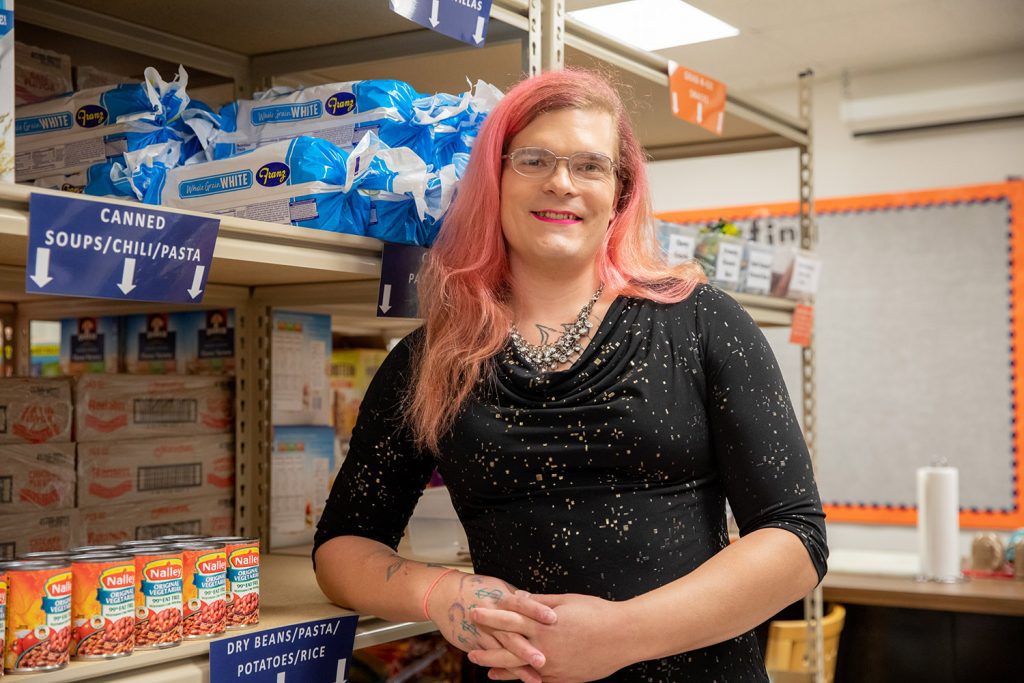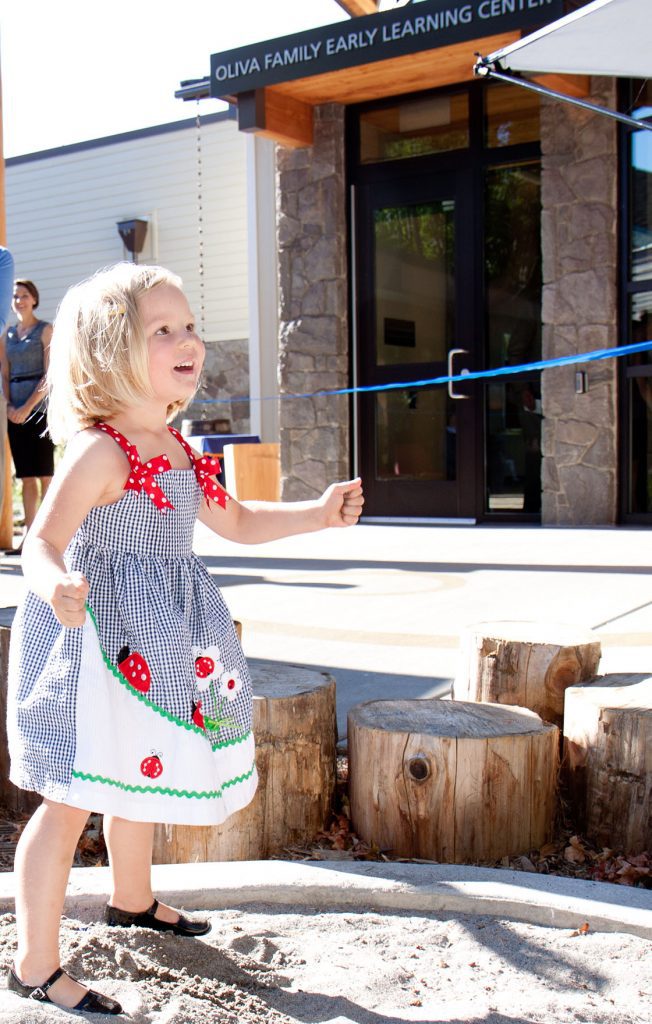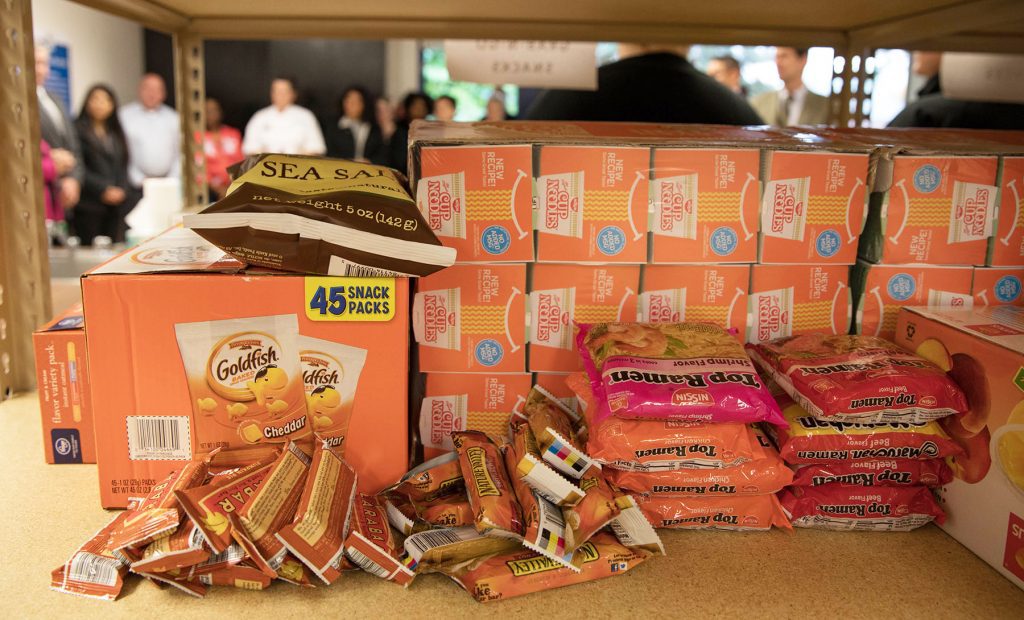Ready. Got help. Go.
Tailored services keep Clark students on their educational path
By Lily Raff McCaulou
Channell Sugar-Star’s road to college was not a smooth one. She bounced between foster homes, endured childhood abuse, struggled with post-traumatic stress disorder and eventually overcame drug addiction. She was in her 30s and newly sober when a woman in her substance abuse recovery program began encouraging her to go to college.
One day, in a car together, Sugar-Star challenged the passenger. “I told her, ‘Sell me on college.’”
The woman predicted that Sugar-Star would excel in school. She could find a career she loved and earn more money. She pointed out that Sugar-Star, who identifies as a transgender woman, would meet more trans people. The pitch worked.
Now clean for two years, Sugar-Star, 34, is a student at Clark College with plans to be a chemical dependency practitioner.

Channell Sugar-Star regularly picks up snacks, groceries and hygiene items from Clark’s Penguin Pantry. She completed her third quarter in June, earning high grades. For the first time in her life, Sugar-Star sees a clear path ahead.
Sugar-Star uses scholarships to cover her tuition costs, but Clark has helped in other key aspects of her life, too. Sugar-Star picks up snacks, groceries and hygiene items from the Penguin Pantry. She gets vouchers to help pay for school books. She is applying for housing assistance through Clark. When her purse was stolen, an office on campus helped her replace her identification.
Clark offers an enormous number of support services to students—from child care to housing assistance to emergency grants to résumé-writing support to financial wellness coaching and more. The college is redesigning how these and other wraparound services are matched with students. When Sugar-Star arrived at Clark last year, the college was two years into a multi-year transformation to adopt a new model of education known as guided pathways. One of the goals of the new framework is to match students to the college’s support services more efficiently.
“Community colleges were built to be responsive but we’ve got students that we’ve never served before,” said Shanda Haluapo, associate vice president of Planning and Effectiveness. “So with guided pathways, we’re transforming our services to meet the students where they are.”
Instead of the traditional cafeteria model of education—in which students choose from a buffet of course offerings, occasionally comparing transcripts against the requirements for a particular degree or certificate—Clark is adopting a model in which students, with their advisers, plot out their academic paths from the beginning of enrollment to graduation. Other community colleges around the country have adopted guided pathways and are seeing equitable outcomes for students across all races, genders and sexual orientation. There are increased student retention rates, faster graduation rates, and lower costs to students.
Hunger on campus
A national report recently found that nearly half of all college students routinely skip meals to help make ends meet. Meanwhile, national student debt totals about $1.5 trillion. Rates of basic needs insecurity are even higher among those attending two-year colleges than four-year colleges. And the inequity is magnified for non-dominant students such as African Americans, and students identifying as LGBTQ, as well as former foster children, military veterans and formerly incarcerated students.
One in 10 Clark College students aged 25 or older has experienced homelessness in the last 12 months, according to a student experience survey conducted in winter 2018. Among Clark students aged 25 and older, 45% experienced housing insecurity and 25% experienced food insecurity in the last year.
Students at Clark already work with their academic advisers to plot out their academic plans.
Starting in September, most Clark students will be required to produce two additional plans for their future: career and financial plans. These documents will have several benefits, according to administrators. One way is by jumpstarting conversations between students and their advisers that could ultimately connect the students to support services.
“We know that faculty have the most contact with students and sometimes hear things that we don’t hear,” said Edie Blakley, director of career services.
Most Clark students are now required to take a course called College 101 during their first quarter, which helps them outline their college plans and introduces them to various support services. A new student orientation also advertises some of the areas where Clark can support students’ needs.
Open doors of opportunity for Clark College students that would otherwise remain closed by giving to Clark’s Penguin Pantry, Career Services, Veterans Resource Center and Emergency Grants. Vivian Manning, CFRE, can assist in finding the service you’re most passionate about. Contact Vivian at 360.992.2104.
Housing
One reason Armetta Burney, interim dean of Workforce Development and Technical Education, knows how many students need support for basics because she personally reviews each emergency grant application. About five to eight times per quarter, a student applies for emergency assistance of up to $500. Most of these cases, according to Burney, relate in some way to housing. A roommate has suddenly moved out and a student needs help covering the rent. A marriage falls apart and a newly single student needs a place to sleep. Skyrocketing housing costs in southwest Washington compound these life events.
“If I could wave a magic wand, honestly, it would be great if we had partnerships with local apartments that provided affordable housing to students,” Burney said. “Because the need is so huge.”
Last year, Clark partnered with The Council for the Homeless to secure money from Vancouver’s affordable housing fund. The partnership resulted in a new direct referral process for Clark students who live in Vancouver’s city limits. Students can sign up for alerts when housing matches their criteria and eligibility.
Taking care of the kids

Clark offers child care subsidies for low-income students who qualify. About 120 families have young children enrolled in Clark’s Child and Family Studies.
Clark offers child care subsidies for low-income students who qualify. About 120 families have young children enrolled in Clark’s Child and Family Studies, where early childhood education students work alongside college faculty to provide care for toddlers and preschoolers. During the summer, school-age children are welcomed into the program. The program is subsidized and prioritizes enrollment for children of Clark College students.
“Our goal is to increase students’ success rate, increase student persistence and increase completion rates,” said Michele Volk, director of Child and Family Studies. “But most of all, we want that student to be surrounded by people who care about them, people who know children and child development and that family partnership.”
The center offers a family life program where Clark students can earn a credit toward graduation while engaging in activities that support child development, such as a family science night that occurred last spring.
It’s hard to go to college while caring for young children, so Volk said it’s important to provide parents with supportive allies. Preschoolers and toddlers become a part of Clark’s community, taking field trips around campus and even displaying college pride. She said she often hears children declare “We’re the Penguins!”
Health care
In May 2019, Clark students had 251 free mental health counseling appointments at the Counseling and Health Center.
“College is a stressful time, and counseling is something that is really a helpful support for students,” said Marianne Luther, program coordinator of the Counseling and Health Center.
The center recently started offering group sessions, including a parenting support group. A nurse practitioner on staff provides physical examinations and writes prescriptions. The center offers some free over-the-counter medications, so a student doesn’t need to ride a bus to a pharmacy for an aspirin between classes.
“I think our services mostly apply to the ‘staying on the path’ part of guided pathways,” Luther said. Free on-campus care can help students with mental or physical health issues and get them help to stay focused on school.

Clark’s Penguin Pantry offers students nonperishable food, toiletries and school supplies. Clark College Foundation accepts cash donations.
Food
At Penguin Pantry, any student who scans their Clark identification card may select a certain number of items. There is no proof of income requested. There are no questions asked. That’s important to the manager of the pantry, Estancia Cota. Cota struggled with food insecurity while she attended Clark from 2005 to 2008.
“I can relate to many of the students who come in here,” she said. “I can make them feel comfortable here.”
Cota is thoughtful about trying to break down the stigma of food insecurity. She plays soft music on a simple sound system and encourages students to heat up their food in the microwave, make themselves a cup of tea or sit down to eat. Some students who walk into the Penguin Pantry for the first time feel embarrassed and obligated to share their stories of hardship.
“I try to stress that we’re here to help them,” she said. “We’re not here to judge, and we don’t need to know their backstory.”
Cota also refers students to other resources on and off campus, including local food banks or Temporary Assistance for Needy Families. She hands out donated gift cards so that particularly needy students can get a meal when class is out and the pantry is closed. Last quarter, Clark students logged 1,980 transactions at the Penguin Pantry—by far the most since the pantry opened two years ago.
Career services
Gone are the days when the career center is the very last step in a college experience, reserved only for soon-to-be-graduates. At Clark, career counseling takes place from the start.
“We want students to understand from the beginning of their academic experience that every moment counts, so they are career-directed and working toward their life goals,” said Blakely.
Students can drop in for help finding a job or internship, as well as assistance in writing their résumés or even figuring out how to decide on a future career. The center holds job fairs throughout the year as well as a free clothing closet for students who need professional clothes.
Clark employs a financial wellness coach who helps students plan to pay off their student debt, create a general household budget and learn to make smart financial decisions.
All of these services help students find a way to overcome the challenges in their lives and finish their education.
Sugar-Star said she would be unable to afford everyday necessities, let alone college, without Clark’s assistance. She is the recipient of two scholarships through Clark College Foundation—the Sharon M. Keilbarth Memorial Scholarship and the E. Gayle Dailey Rubin Scholarship—which allow her to attend college without having to depend on student loans. She spent some of her scholarship money on a cell phone and laptop she uses for homework. She gets free food, school supplies and toiletries from the Penguin Pantry, which helps her save money to rent her own apartment. Clark’s services have helped set her on a new path. And for that, she is grateful.
~~~~~~~~~
Lily Raff McCaulou is a journalist whose writing has appeared in The New York Times, The Atlantic, The Guardian and Rolling Stone. She lives in Bend, Ore. Visit her online at www.lilyrm.com.



